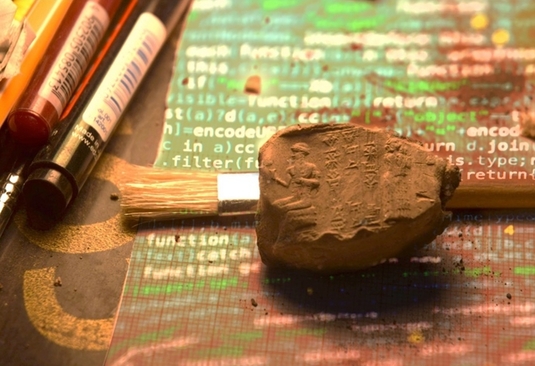KIŠIB - Digital Seal Corpus
KIŠIB. Digital Corpus of Ancient West Asian Seals and Sealings
In spring 2025, the Academy Project KIŠIB. Digital Corpus of Ancient West Asian Seals and Sealings was launched at the Institute of Near Eastern Archaeology.
This collaborative project, jointly conducted by the Bavarian Academy of Sciences and Humanities (BAdW) in Munich and the Berlin-Brandenburg Academy of Sciences and Humanities (BBAW) in Berlin, is based at two institutions: Ludwig-Maximilians-Universität Munich (under the direction of Prof. Dr. Adelheid Otto) and Berlin-Brandenburg Academy of Sciences and Humanities (BBAW) (under the direction of Prof. Dr. Elisa Roßberger).
Over its planned duration of 16 years, an interdisciplinary team of researchers in Near Eastern Archaeology, Assyriology, Digital Humanities, and Information Technology will study approximately 80,000 seals and create a structured, annotated digital corpus of their pictorial and textual elements.
KIŠIB, the Sumerian word for “seal,” refers both to the objects used for sealing and to sealings on clay and cuneiform tablets. The project focuses on seals and sealings from the 4th to the 1st millennium BCE—constituting the largest and only continuously documented pictorial corpus from Ancient Western Asia.

working on a seal impression in Ur (Iraq), 19th century BCE, and the segmentation of information into code (photo composition: interaction of traditional seal research and digital technologies)
electronic picture source: KIŠIB-project, A. Otto/A. Dietz
These miniature masterpieces reveal a wealth of information about the ancient world: they reflect social, political, economic, religious, and artistic connections, the transfer of cultural knowledge, evolving visual languages, and changing worldviews.
Today, thousands of these seals and sealings are housed in museums and collections across the globe. Many remain difficult or impossible to access—even for experts. KIŠIB aims to change that. Through an open-access digital platform, the project will make this important cultural heritage available to researchers from all disciplines and to the general public. A further goal is to support digital repatriation by ensuring that people in Western Asia and worldwide can access and engage with these cultural assets.
To enable flexible search and analysis, the project uses machine learning to process image, text, and metadata. Artefacts are digitally segmented, annotated, and connected across sources in close collaboration with museums, partner projects in the field of digital ancient studies, and colleagues in Western Asia and around the world.
Predecessor Project: ACAWAI-CS (Direction Prof. Dr. Elisa Roßberger)
Contact
Prof. Dr. Adelheid Otto: aotto@lmu.de (PI Project Branch Munich)
Dr. Albert Dietz: Albert.Dietz@kishib.badw.de (Management Project Branch Munich)
Prof. Dr. Elisa Roßberger: elisa.rossberger@fu-berlin.de (PI Project Branch Berlin)
Dr. Sebastian Hageneuer: sebastian.hageneuer@bbaw.de (Management Project Branch Berlin)


